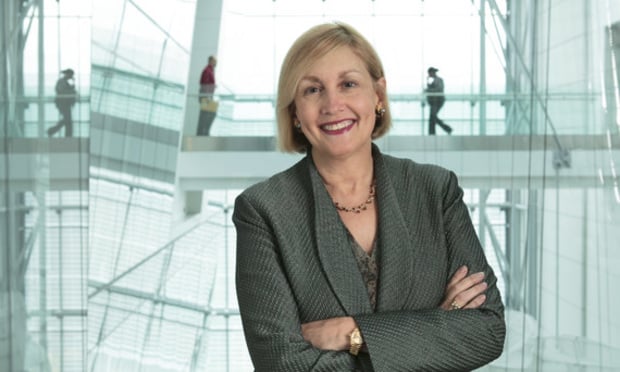'It's Just Been Unreal': Catching Up With Wilmer Hale's Jamie Gorelick on Coronavirus Crisis Management and Matzah Ball Soup
Wilmer Hale partner Jamie Gorelick, who leads the firm's regulatory and government affairs team, walks us through what clients are asking, and how the firm is responding. The fundamentals of crisis response? "One is to stay calm. Two is to exhibit leadership for the rest of the people who are in your organization. Three is to think very clearly about what needs to happen."
April 14, 2020 at 01:21 PM
10 minute read
 Jamie Gorelick of Wilmer Cutler Pickering Hale and Dorr. Credit: Diego M. Radzinschi / ALM
Jamie Gorelick of Wilmer Cutler Pickering Hale and Dorr. Credit: Diego M. Radzinschi / ALM
Last month, as widespread layoffs loomed in the U.S. economy and businesses stood on the verge of shuttering their offices amid the coronavirus outbreak, the law firm Wilmer Cutler Pickering Hale and Dorr sent all of its employees home with equipment to telework.
On March 13, the firm used a Friday to run an experiment—to gather a sense of how it would function with most of its lawyers and staff working from home.
"It worked," said Jamie Gorelick, a Wilmer Hale partner who served as deputy attorney general at the Justice Department during the Clinton administration. "And then we never came back."
In the weeks since, holed up at home in suburban Washington, Gorelick has been called on to help clients navigate the fallout of the coronavirus outbreak as a co-leader of Wilmer Hale's crisis management group. It has been an all-consuming job. Only on Thursday did she finally get around to taking a day off—a "mental health break," she said.
"There's just so much time you can spend in front of a screen," she said.
"I just had to exhale. I did. The good news is I know myself well enough to do that. The bad news is I was driven to it."
In an interview with The National Law Journal, Gorelick shared insights into her experience guiding companies through the myriad crises and questions raised by the ongoing global health emergency. There has been little time diversion—"I have read the same three pages of a book over and over again, and then I fall asleep," she said—and unprecedented challenges. But along the way have come small victories, such as scoring matzah—at last—ahead of a Passover Seder last week.
"It was a triumph," she said with a laugh.
The following conversation was edited for length and clarity.
NLJ: Thanks, Jamie, for taking the time to discuss life in this difficult time. First off, who's hunkered down with you at home?
Gorelick: My husband [Dr. Richard Waldhorn], who is a physician. He was chief of medicine at Georgetown. He's not in the right cohort to go back into the ICU, but he's taking patients from people who can, so he's doing telemedicine in his study. He's affiliated with the Center for Health Security, so he's been very much involved in tracking the pandemic. So we have both been just unbelievably busy.
That has to give you a closer view into the public health response. What has it been like to have your husband working on the medical side of this crisis?
In some ways it's reassuring. He does have a front-row seat on the medical and pandemic end. He's able to help people who need medical help. Seeing what the public health folks are thinking about before it's public has been interesting to him. And I am seeing pretty much all manner of COVID-related legal questions, because we stood up a COVID-19/coronavirus task force very early on. We put out what I think is an excellent letter every day to our clients and friends. That kept us in the loop as to what is on people's minds, whether it's the Defense Production Act, or the PREP Act or the Payment Protection Program, or how to deal with their employees, what all the different state and local ordinances mean for particular businesses. It's been fascinating.
Has your workload been all coronavirus all the time, responding to crises immediately rooted in the outbreak, or have you also been juggling preexisting matters?
[Laughs] We still have the work we had before. This has just come on top, which is why I needed the break [Thursday], because I worked every day for a month, and long days. The coronavirus questions come on top of that, come on top of whatever you had beforehand. Now, I don't have all the travel time that I used to have, so some of the [demands] on my time have been subtracted, but more has been added.
 Wilmer Hale's D.C. offices. (Photo: Diego M. Radzinschi/NLJ)
Wilmer Hale's D.C. offices. (Photo: Diego M. Radzinschi/NLJ)What have been some of the more complicated questions?
For several clients, we are cataloging every single state and local ordinance, and then helping them figure out what it means for each of their businesses, where clients are in multiple, in some cases all, jurisdictions and have multiple businesses. That's been No. 1. No. 2 has been the stimulus, so either advocacy for our clients who want to ensure that whatever stimulus comes out is structured in a sensible way, and once the CARES Act passed, it was helping companies apply. The Defense Production Act, which we have a lot of expertise in, has been an unbelievable amount of our work—issues like repurposing an industrial factory to make ventilators or respirators raises all kinds of questions. Then you have issues like force majeure. We have any number of pieces of litigation in which the companies or the plaintiffs have decided they would really rather mediate or arbitrate. So cases that were in active litigation are now being handled in a different way. Our arbitration practice has increased in that regard. I could go on and on. It's just been unreal.
In the white-collar defense practice, many lawyers talk about the importance of being in the room with somebody—whether for a meeting with a client, with the government or in an interview during an investigation. Now Zoom has become a household name and everyone's videoconferencing. What have you found to be the highest hurdle or practical challenge to working in this period?
For me, it really hasn't been that hard. I'm used to working virtually, we have excellent WebEx tools. I can use any of the other many platforms really easily. We are undertaking the sexual harassment investigation for the University of Michigan. That's ongoing, and you could imagine it's hard to do virtually. But you have to do it.
In internal investigations like that, how have you gone about assessing what can move forward and what should be delayed until we can all leave our houses again?
We're doing it, as you might guess, on a one-by-one basis. Each one of them is different. Sometimes you can gather what you need via email, sometimes you need a phone call, sometimes you need a video. And sometimes you say that one is too sensitive and we'll just put it off.
How far are you comfortable putting things off?
That is really the big question. Everybody's going to be revisiting everything every couple of weeks. That's one of the big debates. I don't know what's going to happen. I think that whatever anyone does to "reopen the economy," I don't think people are going to go back to work until they think it's safe.
 U.S. Justice Department headquarters in Washington, D.C. Photo credit: Diego M. Radzinschi/ The National Law Journal
U.S. Justice Department headquarters in Washington, D.C. Photo credit: Diego M. Radzinschi/ The National Law JournalUnder the Clinton administration, you were second-in-charge at the Justice Department and general counsel at the Pentagon. You advised BP in the response to the Deepwater Horizon oil spill. What experiences have you drawn on in responding to this particular crisis?
I personally have dealt with a lot of crises. So, whether they're small or large, geographically distinct or global, the skills and the characteristics that you need to summon are the same. You think about the Oklahoma City bombing, where I was at the Justice Department, or the 9/11 attacks, where I was inside a company. Or you think about any number of crises when I was at [the Defense Department]. It may seem weird to say this, but this is what I do.
It's unbelievable. It is of a scope and scale that is different than anything else anyone has seen in terms of the economy shutting down, the level of death and destruction. It is different in that way.
What do you see as the fundamentals of crisis response?
One is to stay calm. Two is to exhibit leadership for the rest of the people who are in your organization. Three is to think very clearly about what needs to happen. And four is to imagine what is likely to happen next or could happen next before it happens and prepare for it.
On a lighter note, you mentioned that you have been working around the clock. But have you found any time for diversion—a book, a Netflix show?
Well, I'm exercising every day, which is not all that different from the norm, but I'm trying to be very disciplined about that. We are having virtual dinners with friends pretty much every night. So that's my time to relax.
I've been so flat out that I work pretty much all day and most of the evening, and then I go to sleep. I have read the same three pages of a book over and over again, and then I fall asleep. That has to stop, but that is where I currently am.
And happy Passover. How has it gone for you?
We had a lovely Seder with extended family on Wednesday, and had another one on Saturday. And we managed to find some matzah. It's a little weird to have Passover when you can only find some of the ingredients you need for the food part of it. It's a celebration of continuity, it is a commitment to freedom and to repairing the world. And, of course, it features plagues, so it's a pretty apt holiday.
I am definitely making my mother-in-law's matzah ball soup, which is an all-day proposition. For ours, you start with a chicken carcass. It's legit. Then you add sweet potatoes and celery and carrots—everything pureed. And, oh, it's unbelievable.
Read more:
'Unprecedented Need for Information': Inside Lobbying Frenzy Over Covid-19 Stimulus
New Normal Sets In for White-Collar Lawyers in the Virus Era
'It's Going to Be Extraordinary': Predictions From Neil Barofsky for Coronavirus Oversight
In Washington, Big Law Partners Bring a Spirit of Resilience to the New Normal
This content has been archived. It is available through our partners, LexisNexis® and Bloomberg Law.
To view this content, please continue to their sites.
Not a Lexis Subscriber?
Subscribe Now
Not a Bloomberg Law Subscriber?
Subscribe Now
NOT FOR REPRINT
© 2025 ALM Global, LLC, All Rights Reserved. Request academic re-use from www.copyright.com. All other uses, submit a request to [email protected]. For more information visit Asset & Logo Licensing.
You Might Like
View All
GOP Now Holds FTC Gavel, but Dems Signal They'll Be a Rowdy Minority
6 minute read
Fired by Trump, EEOC's First Blind GC Lands at Nonprofit Targeting Abuses of Power
3 minute read
Latham Adds Former Treasury Department Lawyer for Cross-Border Deal Guidance
2 minute read
'Erroneous Rulings'?: Wilmer Asks 4th Circuit to Overturn Mosby's Criminal Convictions
3 minute readLaw Firms Mentioned
Trending Stories
- 1From Hospital Bed to Legal Insights: Lessons in Life, Law, and Lawyering
- 2‘Diminishing Returns’: Is the Superstar Supreme Court Lawyer Overvalued?
- 3LinkedIn Accused of Sharing LinkedIn Learning Video Data With Meta
- 4Delaware Supreme Court Agrees Insurance Dispute Can Be Retried
- 5New Strategies For Estate, Legacy Planning
Who Got The Work
J. Brugh Lower of Gibbons has entered an appearance for industrial equipment supplier Devco Corporation in a pending trademark infringement lawsuit. The suit, accusing the defendant of selling knock-off Graco products, was filed Dec. 18 in New Jersey District Court by Rivkin Radler on behalf of Graco Inc. and Graco Minnesota. The case, assigned to U.S. District Judge Zahid N. Quraishi, is 3:24-cv-11294, Graco Inc. et al v. Devco Corporation.
Who Got The Work
Rebecca Maller-Stein and Kent A. Yalowitz of Arnold & Porter Kaye Scholer have entered their appearances for Hanaco Venture Capital and its executives, Lior Prosor and David Frankel, in a pending securities lawsuit. The action, filed on Dec. 24 in New York Southern District Court by Zell, Aron & Co. on behalf of Goldeneye Advisors, accuses the defendants of negligently and fraudulently managing the plaintiff's $1 million investment. The case, assigned to U.S. District Judge Vernon S. Broderick, is 1:24-cv-09918, Goldeneye Advisors, LLC v. Hanaco Venture Capital, Ltd. et al.
Who Got The Work
Attorneys from A&O Shearman has stepped in as defense counsel for Toronto-Dominion Bank and other defendants in a pending securities class action. The suit, filed Dec. 11 in New York Southern District Court by Bleichmar Fonti & Auld, accuses the defendants of concealing the bank's 'pervasive' deficiencies in regards to its compliance with the Bank Secrecy Act and the quality of its anti-money laundering controls. The case, assigned to U.S. District Judge Arun Subramanian, is 1:24-cv-09445, Gonzalez v. The Toronto-Dominion Bank et al.
Who Got The Work
Crown Castle International, a Pennsylvania company providing shared communications infrastructure, has turned to Luke D. Wolf of Gordon Rees Scully Mansukhani to fend off a pending breach-of-contract lawsuit. The court action, filed Nov. 25 in Michigan Eastern District Court by Hooper Hathaway PC on behalf of The Town Residences LLC, accuses Crown Castle of failing to transfer approximately $30,000 in utility payments from T-Mobile in breach of a roof-top lease and assignment agreement. The case, assigned to U.S. District Judge Susan K. Declercq, is 2:24-cv-13131, The Town Residences LLC v. T-Mobile US, Inc. et al.
Who Got The Work
Wilfred P. Coronato and Daniel M. Schwartz of McCarter & English have stepped in as defense counsel to Electrolux Home Products Inc. in a pending product liability lawsuit. The court action, filed Nov. 26 in New York Eastern District Court by Poulos Lopiccolo PC and Nagel Rice LLP on behalf of David Stern, alleges that the defendant's refrigerators’ drawers and shelving repeatedly break and fall apart within months after purchase. The case, assigned to U.S. District Judge Joan M. Azrack, is 2:24-cv-08204, Stern v. Electrolux Home Products, Inc.
Featured Firms
Law Offices of Gary Martin Hays & Associates, P.C.
(470) 294-1674
Law Offices of Mark E. Salomone
(857) 444-6468
Smith & Hassler
(713) 739-1250








